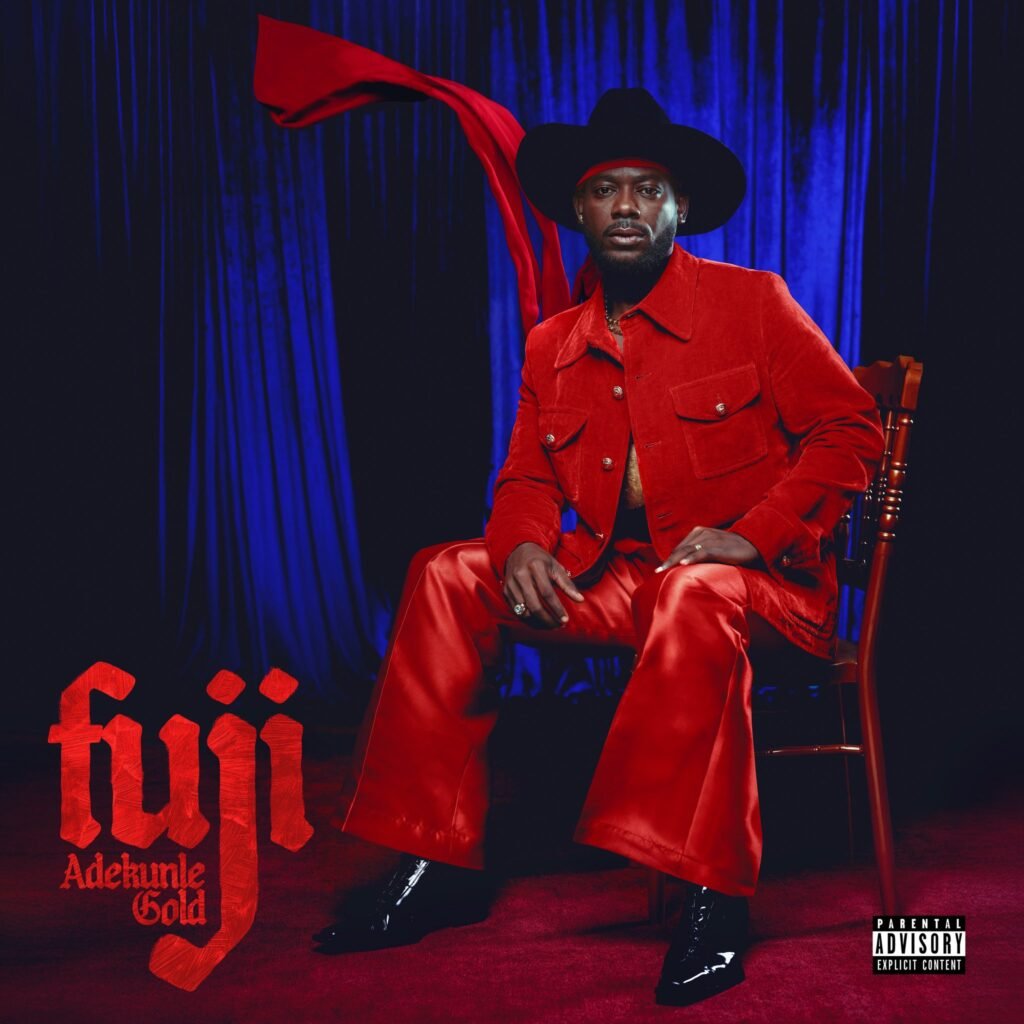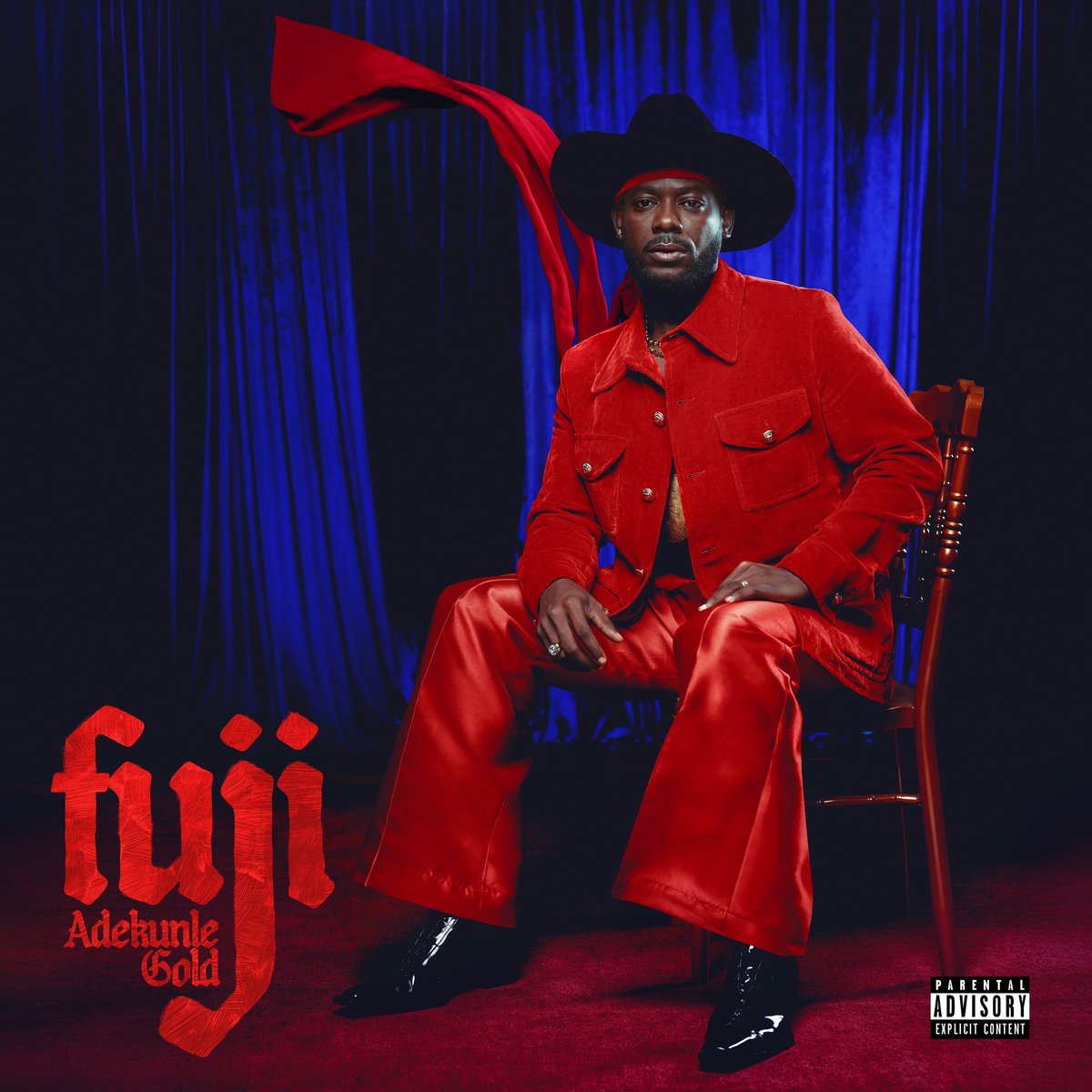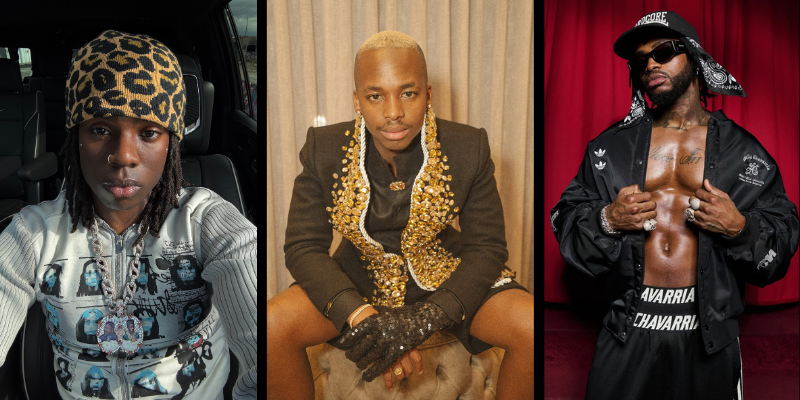Since releasing his debut album Gold in 2016, Adekunle Gold has built one of the finest discographies in Nigerian music. His 2018 album About 30 initially received mixed reviews from critics, but it has aged well over time. Afro Pop Vol. 1 (2020) is widely regarded as a modern classic. With Catch Me If You Can (2022), he unveiled his “Bad Boy Deks” persona in all its pop star glory. He then reached new heights with Tequila Ever After (2023), an album that cemented his status as a rockstar.
One of Adekunle Gold’s greatest strengths is his willingness to evolve as necessary. Not one to be pigeonholed, he is consistently transforming his sonic and stylistic brand to reflect whatever his artistic vision demands.
His sixth studio album, Fuji, marks another step in his artistic evolution as he steps away from the rockstar persona that defined his last two albums and embraces the music he grew up listening to as a child. In an interview with Apple Music’s Africa Now Radio, he revealed that he grew up listening to Fuji music, crediting his aunt for constantly playing it. “It became a part of my life. I listened to it on the street. Fuji is just the sound of Lagos. It’s at every party, every event; they play it everywhere. It’s ingrained in me; it’s a part of my life,” he said.

Now an internationally renowned performer with street cred across Europe and North America, his latest album aims to showcase to the world the music that soundtracked his childhood. With Fuji, Adekunle Gold attempts yet another bold creative swing. The album promises not just a nod to his roots, but a full embrace of the sound and culture that raised him, reimagined for a contemporary and international audience.
The album opens with aplomb. Big Fish is a triumphant anthem that documents how he overcame adversity and achieved success. He reflects on his journey from struggling to make ends meet to rising to fame and wealth. With picturesque storytelling, Adekunle Gold shares his experiences, from hustling on the streets of Lagos to shutting down Los Angeles and Minnesota. From rocking a fake rollie in an attempt to fit in to finding self-worth in hard-earned success. Effortlessly switching flows, he basks in the euphoria of his wealth and success: “High society shit, I’m living a good life / My Bugatti just arrived,” he sings.
There’s a palpable sense of pride on the record, pride that can only be earned from achieving success through relentless hard work. For Adekunle Gold, his success is a direct result of his own efforts. “I work for my shit, mi o gbowo Bourdilon,” he sings, declaring that he earned his wealth without sacrificing his integrity or kissing the asses of those in power. Now, he’s enjoying the fruits of his labour. He repeats similar sentiments on the nostalgic Many People, which borrows from Yinka Ayefele’s record of the same title. It’s a celebration of growth and personal victories over a fusion of Tungba and Afropop.
Big Fish is the start of a deliberate four-track suite that establishes AG’s current mindset before he pivots into more personal terrain deeper into the album. On the braggadocious, percussion-driven Don Corleone, he displays the cockiness of Bad Boy Deks, declaring himself the standard with no competition in sight. Employing twirling adlibs and backing vocals from Simi, he urges movers and shakers to show their paper. With lyrics that transition from braggadocious claims like “I’m the best, no competition” to witty one-liners, the song is a masterclass in lyrical dexterity delivered with swagger.
Bobo, featuring Lojay and Shoday, continues his celebration of wealth, success, and the luxuries that come with it. Over Niphkeys’ groovy instrumental, the trio deliver confident performances that celebrate wealth, success, and enjoyment. The hook, built around the chant “Bobo, bobo… Na easy, sabalili,” sets a playful tone that contrasts with verses reflecting on financial power and how money influences respect and appearance. With references to figures like Saraki and Jim Ovia, as well as nods to Bitcoin and luxury cars, the record paints a picture of a modern big spender who has risen above scarcity and now lives life on his own terms. Lojay’s performance on this record deserves praise. He aces his verse like John Cena in the ruthless aggression era, delivering it with a charismatic flow that commands attention immediately his verse kicks in. He cuts through the beat with precision, dropping quotables and clever lines with effortless showmanship that elevates the record. It’s an outstanding guest performance, the best on the album.
On Coco Money, AG’s message is clear: if you’re not about spending, step aside. The opening “Attention, attention / If you’re not spending money, go, go, go” sets a clear tone. It’s a high-energy money anthem, the kind of record that would thrive in spaces where money talk carries weight.
From the high-energy flexes of the album’s opening stretch, Adekunle Gold pivots into more personal territory with Believe. On the record, which samples Grover Washington Jr and Bill Withers’ Just The Two of Us, he delivers tender lyrics and heartfelt storytelling, reminiscing about love’s impact with charm and sincerity. On My Love Is the Same, he offers listeners a personal moment with his daughter before opening up about the challenges of balancing his responsibilities as a provider with his emotional bond to her. “My baby dey asks for me, but I’m fighting the economy. I’m sorry,” he sings, apologising for not spending enough time with her. Lailo is an expression of his deep affection and admiration for a special woman. He likens her to an angel who’s always on his mind, praising her beauty like the famous Mona Lisa. He describes her as the standard of perfection, someone he’s willing to spend everything on, declaring, “My money is your money na so.” On the pre-released Obimo, he passionately declares his deep affection and expresses his commitment to her and her alone.
The punchy TMXO-produced Love is an Action featuring American R&B star 6lack blends Afropop and Amapiano elements. Both artists complement each other smoothly as they explore the idea that love is measured through action, not just words. “Love is an action, because when I love, I love so hard with passion. Mo ti gbọn, I’ve wisened up, I’m a different person,” he sings, embodying a man who has experienced heartbreak and learnt from it. The record unpacks what it means to love deeply in an age where reciprocity in relationships is not guaranteed.
He reconnects with Davido on Only God Can Save Me, which captures the tension between commitment and attraction, with both married singers acknowledging the irresistible pull of attention from beautiful women while humorously accepting their own weaknesses.
On the deeply compelling record Simile, Adekunle Gold seeks stability amid life’s unpredictable currents, looking for something solid to hold onto. Meanwhile, I’m Not Done, featuring renowned American pianist Robert Glasper, reflects on perseverance and the enduring pursuit of one’s craft, exploring themes of resilience and artistic longevity. Obimo brings the album to a close.
Overall, the album is strong, and the music throughout is thoroughly enjoyable. The album’s high points shine vividly. On Don Corleone, where he resplendently reigns supreme, radiating an aura of unstoppable confidence over pounding rhythms that propel the track, showcasing intricate beatwork that captures Fuji’s rhythmic essence. He’s the man, and he is well aware of it. And on this album, he offers listeners different sides of the man. Sometimes, he is a wealthy MF who can be cocky if the situation calls for it. Other times, he’s a loving father and a romantic who has to deal with life on the road and the pressures of superstardom. He’s a family man whose profession demands he spend significant time away from home, and he has to deal with women around the world throwing themselves at him. But it’s a tension he would have to be comfortable with; his job pays him well, and as he passionately exclaimed on the opening record, he doesn’t want to go back to poverty.
His ability to shapeshift across genre and personality lines makes his album, especially this one, so engaging, giving each track its own personality while keeping listeners hooked throughout. Records like Love is an Action, Simile, My Love is the Same, and I’m Not Done are first-class, rich in depth and quality. Even a filler like “Attack” sounds like something that could pop off if positioned well. “Coco Money” is the first song this writer is going to play when he makes his first 100 million.
Adekunle Gold always seems to go up another level with every new album, the latest always surpassing its predecessor in all-around quality. The production on this album is polished and rich, adequately suited to the demands of this album.
Conversations around the project’s sonic identity as Fuji have swiftly followed the album’s arrival. The project was branded as AG’s homage to the music he grew up on. While many anticipated a robust exploration of Fuji in the music, the Fuji extravaganza on this album is confined to the opening four tracks and the Ayefele-inspired Many People. Despite the title, the album leans on familiar Afropop, R&B, and contemporary fusion sounds that Adekunle Gold comfortably explores.
One would expect that Adekunle Gold, who gave Nigerian folk music its voice in the mainstream and has never shied away from embracing his cultural heritage, would deliver a robust exploration of the genre, especially since his intention, as he revealed in the aforementioned Apple Music Africa Now Radio, is to showcase Fuji music to the world.
While this album does not offer the expansive reimagination of Fuji music that many expected, what the album does well is combine elements of Fuji music by way of delivery and instrumentation with modern sensibilities and present the music in a way that resonates with a much broader audience. It might not be the traditionalist’s interpretation of Fuji, but the album undoubtedly pays homage to the genre.
When you also consider the fact that the Nigerian music soundscape is still searching for its next dominant pop sound and attention continues to turn toward indigenous sounds for inspiration, we’ll likely see more artistic adventures like this one, with artists tapping into indigenous sounds and reinterpreting them through contemporary lenses.
That said, this writer would also expect him to commit to a fuller, deeper interpretation of Fuji. One would expect that if there’s anyone capable of conceptualising and delivering a Fuji album that meets and shapes the demands of today’s music landscape, it’s Adekunle Gold.


















